Reading Comprehension Text and Exercises
Istanbul
Between Europe and Asia
Istanbul, which used to be known as Constantinople and Byzantium, is the most populous city in Turkey, and one of the largest cities in the world, with the population of nearly 15 million people.
Built on the Bosphorus strait (a narrow passage linking two seas), this magical city connects two continents. It only takes several minutes to move from Europe to Asia by boat. It is a city where more than two millennia of history awaits you.
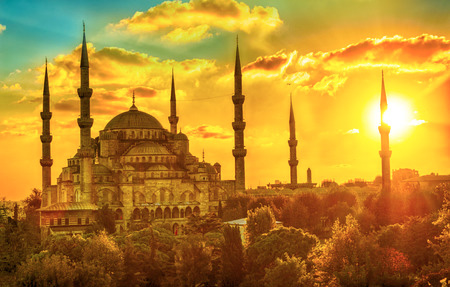
Click Here for Step-by-Step Rules, Stories and Exercises to Practice All English Tenses
A Brief History of Istanbul
- The first recorded name of the city, Byzantium, is more than 2,500 years old. At that time, the city belonged to the Greeks.
- Istanbul was named Constantinople after Constantine the Great, who made the city the new eastern capital of the Roman Empire in 330 AD.
- The city stood strong for over a thousand years until it was conquered by the Ottomans in 1453. Constantinople was the last remaining outpost of the Roman Empire.
- Istanbul stayed the center of political power and commerce of the Ottoman Empire until World War I, when the Empire ceased to exist.
- After the War of Independence, the city of Ankara, strategically located in the center of the country, was declared the new capital city of the Republic of Turkey.
- Istanbul remains the fastest developing and most popular city in Turkey to date.
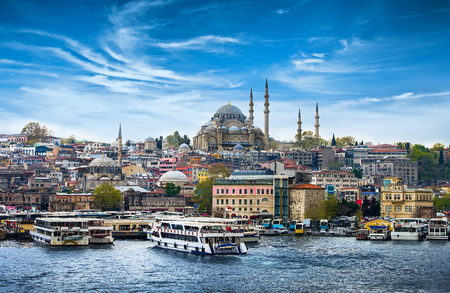
Attractions
Hagia Sophia
Hagia Sophia (meaning Holy Wisdom in Greek) was built in the 6 century, and until 1453 it served as a Greek Orthodox church. When Istanbul was conquered by the Ottoman Empire, Hagia Sophia was converted into a mosque and served as such until 1931.
As Turkey became a secular republic, Hagia Sophia stopped a religious purpose and was opened as a museum in 1935. For most of its history, Hagia Sophia was the largest church in the world, and it is believed to have completely changed the history of architecture with its massive dome. The dome, in fact, inspired a lot of the Islamic architecture, which is why today many mosques resemble to Hagia Sophia.
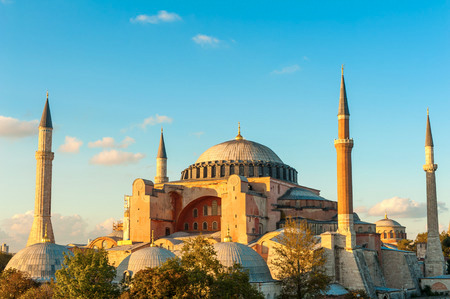
Topkapi Palace
This large complex on the Bosphorus is one of the most visited museums in Turkey. However, in the 15th century, it was the main residence of the Ottoman sultans (emperors). The palace consisted of four main courtyards, many smaller buildings and a harem, the place where all the women of the palace lived.
As the empire was expanding, Topkapi Palace gradually lost its importance for the sultans. Today, only a few of Topkapi's several hundreds of rooms and chambers are open for visitors.
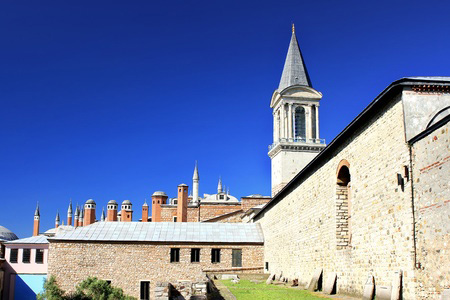
Spice Bazaar
When in Istanbul, make sure you go to one of the bazaars (markets). The most famous one, of course, is the big Spice Bazaar. Built in the 17th century, this covered market is a perfect place to meet the locals and try their products. In addition to a variety of colorful spices, you can also buy jewelry, honey, nuts and dried fruits, all produced locally. Feel free to bargain for some more expensive products.
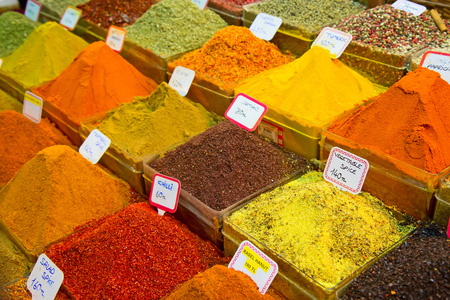
Sultan Ahmed Mosque
Also known as the Blue Mosque due to the colors of its walls and domes, this is one of the most magnificent structures in the city. Although it is over a thousand years younger, the Sultan Ahmed Mosque sits right next to Hagia Sophia. It is still a fully functional mosque, which means that tourists also have to obey the religious rules if they want to enter inside and see its amazing interior.
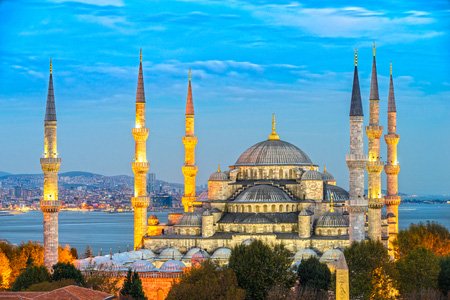
Things to do in Istanbul:
- Go to a hamam, a traditional Turkish bath for a massage or a sauna. Many of Istanbul's baths are historical places, so they are nice to see from the inside.
- Enjoy traditional Turkish breakfast in Besiktas, one of the city's busiest neighborhoods. If you want to eat like a local, your breakfast, consisting of cheese, honey, eggs, gevrek (Turkish bagel) and vegetables, should take hours.
- Buy Turkish delight (lokum) from one of the markets. These delicious sweets come in different flavors, the most popular being pistachio or pomegranate. They go perfectly with a cup of black Turkish tea, which is the national drink of Turkey.
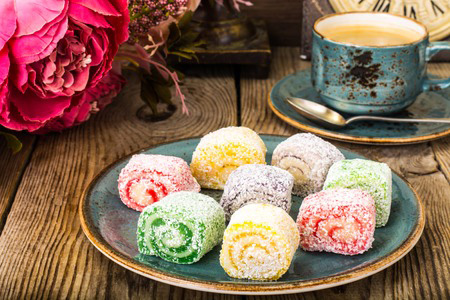
Comprehension Exercises
Vocabulary Questions
- What does "mosque" mean?
- any large building in Istanbul
- a Turkish square
- a Muslim place of worship
- What does "secular" mean?
- not connected with any religious matters
- only used by local people
- presidential
- What does "outpost" mean?
- a sent letter or package
- a camp located in the countryside
- a remote part of a country or empire
- What does "bargain" mean?
- offering to pay more for something
- offering to buy something at a lower price
- asking to get something for free
- What does "dome" mean?
- a rounded part at the top of the roof
- an Ottoman-style entrance
- an ancient Greek arch
Collocation Questions
- The Sultan Ahmed Mosque is still a fully ___________ mosque.
- operational
- useable
- functional
- In 1453, Hagia Sophia was ___________ into a mosque.
- turned
- converted
- changed
- After World War I, the Ottoman Empire ___________ to exist.
- ceased
- stopped
- terminated
- Over the years, Topkapi Palace ___________ lost its importance.
- slowly
- gradually
- moderately
- Istanbul remains the fastest developing city in Turkey ___________.
- until now
- so far
- to date
- If you want to eat ___________ a local, your breakfast should take hours.
- like
- as
- similarly to
- Many great mosques ___________ Hagia Sophia.
- resemble to
- remind of
- look like
- Visitors of the Blue Mosque have to ___________ the religious rules.
- follow
- obey
- execute
- At the market, feel ___________ to bargain.
- welcome
- free
- open
- More than 2,000 years of history ___________ you in Istanbul.
- awaits
- greets
- waits for
Wh Questions
- Why did Ankara become the capital of modern Turkey?
- because it is bigger than Istanbul
- for practical reasons
- for strategic reasons
- What is the national drink of Turkey?
- Turkish coffee
- black tea
- pomegranate juice
- Who named the city Byzantium?
- the Greeks
- the Romans
- the Ottomans
- When was Hagia Sophia built?
- 5th century BC
- 5th century AD
- 6th century AD
- Where is the Topkapi Palace located?
- in Besiktas
- outside Istanbul
- along the Bosphorus
Evaluating Statements
- Based on the information in this lesson, which statement is true?
- In the Topkapi Palace museum, you can see how the Roman emperors lived.
- In the Topkapi Palace museum, you can see how the Ottoman sultans lived.
- Based on the information in this lesson, which statement is false?
- Both churches and mosques had been built with domes before Hagia Sophia.
- In the past several centuries, mosques have been built with domes because they are inspired by Hagia Sophia.
True or False?
- Based on the information in this lesson, is the following statement true or false?
"After the fall of Istanbul, the Roman Empire continued to exist for another 50 years." - True
- False
- Based on the information in this lesson, is the following statement true or false?
"Some people in Istanbul live in Europe and some in Asia." - True
- False
Answer Key
1. C | 2. B | 3. C | 4. B | 5. A | 6. C | 7. B | 8. A | 9. B | 10. C | 11. A | 12. A | 13. B | 14. B | 15. A | 16. C | 17. B | 18. A | 19. C | 20. C |21. B | 22. A | 23. B | 24. A
Get Updates, Special Offers, and English Resources
Download your FREE GIFT (the first two chapters of
English Short Stories Book and Workbook)
as soon as you join!

By submitting your email, you consent to receiving updates and newsletters from us and to the sharing of your personal data with third parties for the purposes of sending you communications. We will not spam you. You can unsubscribe at any time. For more information, please see our privacy policy.
Return from Istanbul, between Europe and Asia to English Reading Comprehension Texts and Exercises





